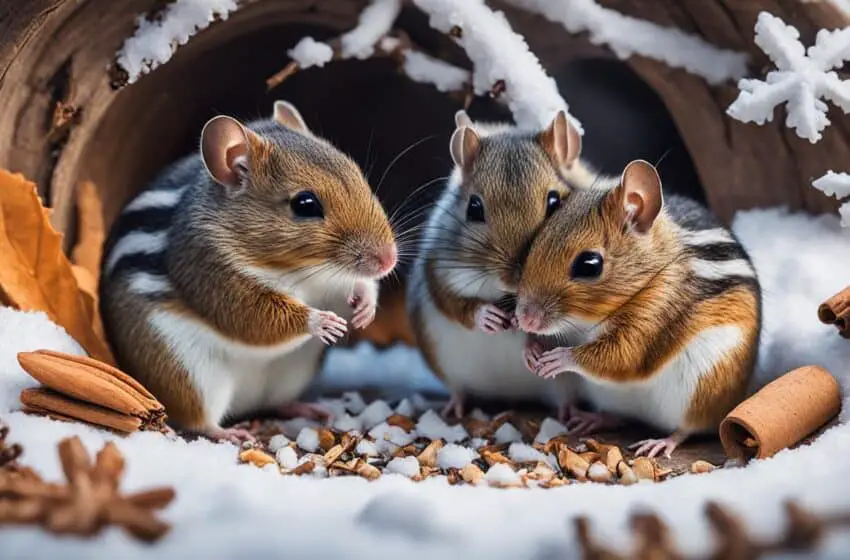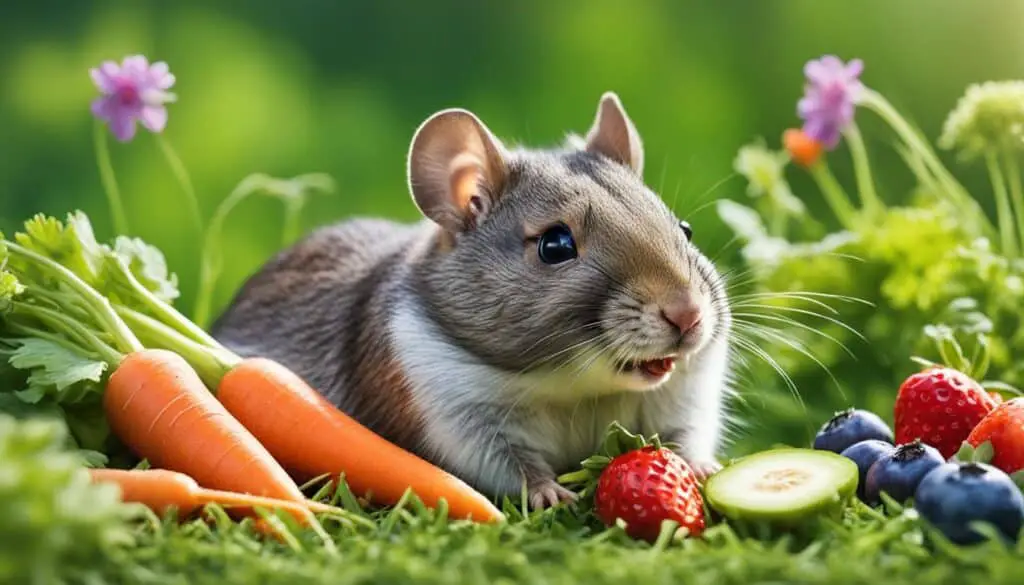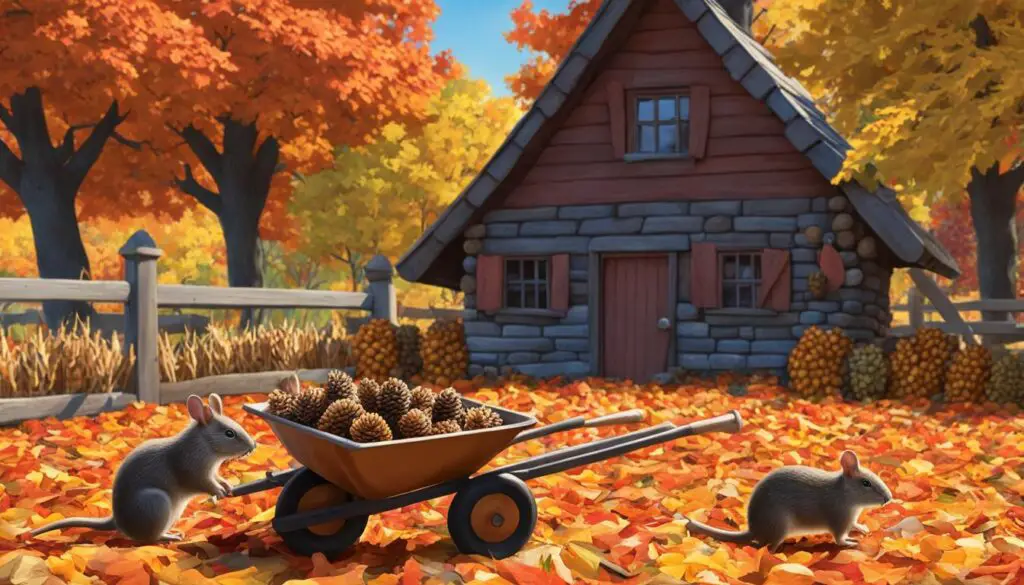Seasonal Care Tips for Small Rodents

As a small rodent owner, I understand the importance of providing the best care for my furry companions. Small rodents can be sensitive to changes in climate, and it is crucial to provide them with appropriate care throughout the seasons. By following these seasonal care tips, you can ensure that your small rodents stay healthy and happy, regardless of the changing climates.
Key Takeaways:
- Seasonal care is essential to maintain the health and happiness of small rodents
- Provide adequate shelter and bedding during winter to keep them warm
- Offer a diet rich in fresh fruits and vegetables during spring
- Keep small rodents hydrated and cool during the summer months
- Make diet adjustments and encourage exercise in the fall
Winter Care for Small Rodents
During the winter months, it is essential to provide small rodents with adequate shelter and bedding to keep them warm. These tiny creatures are particularly sensitive to the cold, so it’s crucial to create a cozy and comfortable environment for them.
To ensure their well-being, keep their cage away from drafts, as exposure to cold air can lead to temperature fluctuations that may negatively impact their health. Placing their habitat in a warm and sheltered area of your home is ideal.
The temperature within their habitat is also crucial. Small rodents thrive in temperatures between 65-75 degrees Fahrenheit (18-24 degrees Celsius). Use a reliable thermometer to monitor the temperature and make necessary adjustments to maintain a consistent and comfortable environment.
Extra bedding is essential during winter to provide additional insulation. Consider layering their cage with safe and cozy materials such as shredded paper, hay, or wood shavings. The extra bedding will help keep them warm and provide a sense of security.
Proper shelter and bedding are vital for small rodents during the winter season. It’s crucial to provide them with a warm and draft-free environment to prevent temperature fluctuations and ensure their well-being.
Additionally, it’s important to pay special attention to their hydration. Cold temperatures can impact water bottles, causing them to freeze. Regularly check and replace their water supply to ensure they have access to fresh, unfrozen water at all times.
“Ensuring proper hydration is crucial during the winter months. Regularly check your small rodent’s water bottle to prevent freezing and provide them with fresh water.”
Here is a visual representation of winter care essentials for small rodents:
| Winter Care Essentials for Small Rodents | |
|---|---|
| Shelter | Place the cage away from drafts |
| Temperature | Maintain the habitat temperature between 65-75°F (18-24°C) |
| Bedding | Add extra bedding for insulation |
| Hydration | Regularly check and replace water to prevent freezing |
By following these winter care tips, you can ensure that your small rodents stay warm, comfortable, and healthy throughout the chilly season.
Spring Care for Small Rodents
In the spring, small rodents require special care to ensure their health and well-being. Here are some essential tips for providing excellent spring care for your furry friends:
Diet: Fresh Food for a Healthy Diet
A springtime diet for small rodents should consist of fresh fruits and vegetables, providing them with essential vitamins and nutrients. To avoid digestive issues, introduce new foods gradually, allowing their digestive systems to adjust. Monitor their response to each new food item and make adjustments accordingly.
Exercise: Encouraging Activity and Play
Spring is the perfect time to encourage your small rodents to stay active and engaged. Provide them with plenty of toys and opportunities for play, such as tunnels, wheels, and shreddable toys. This not only prevents boredom but also helps them develop their physical and mental abilities.
Cleaning: Maintaining a Clean Environment
Cleaning their cage regularly is crucial in preventing any buildup of waste, minimizing the risk of infections and odors. Remove any soiled bedding, uneaten food, and droppings daily. Replace the bedding entirely every 1-2 weeks to maintain optimal hygiene.
Grooming: Keeping Coats Healthy
Grooming is essential to keep your small rodent’s coat healthy and free of tangles or mats. Depending on the type of rodent you have, grooming may involve brushing their fur, trimming their nails, and ensuring their ears and teeth are clean. Regular grooming sessions not only enhance their physical appearance but also contribute to their overall well-being.
| Spring Care Tips for Small Rodents |
|---|
| Provide a diet rich in fresh fruits and vegetables |
| Introduce new foods gradually to avoid digestive issues |
| Encourage exercise and play with toys |
| Clean their cage regularly to prevent waste buildup |
| Groom them as needed to keep their coats healthy |

Summer Care for Small Rodents
During the summer, it is crucial to prioritize the well-being of your small rodents. They can easily become dehydrated in the heat, so maintaining proper hydration is essential. Offer fresh, clean water at all times and consider adding a water source that can be used for misting or added moisture. This will help keep your furry friends cool and comfortable.
It’s important to create a cool environment for your small rodents to prevent overheating. Ensure their cage is placed away from direct sunlight and kept in a well-ventilated area. This will allow for proper air circulation and help regulate the temperature. Consider using fans or providing a cool surface, such as a ceramic tile, for them to rest on. Keeping their environment cool will greatly contribute to their overall health and happiness.
Proper ventilation is key to maintaining a cool and comfortable environment for your small rodents.
Additionally, be mindful of parasites such as fleas and ticks that tend to be more prevalent during the summer months. Regularly check your small rodents for any signs of infestation and take necessary measures to prevent and treat these parasites. Consult with a veterinarian for appropriate prevention methods and products to ensure your furry friends are protected.
Summer Care Checklist for Small Rodents:
- Provide fresh, clean water at all times
- Add a water source for misting or added moisture
- Keep their cage in a cool environment, away from direct sunlight
- Ensure proper ventilation for air circulation
- Use fans or provide a cool surface for them to rest on
- Regularly check for parasites and take necessary preventive measures
| Care Tips | Description |
|---|---|
| Hydration | Provide fresh, clean water and consider adding a water source for misting or added moisture |
| Cool Environment | Keep their cage in a cool area, away from direct sunlight, and ensure proper ventilation for air circulation |
| Parasite Prevention | Regularly check for fleas and ticks and take necessary preventive measures |
Fall Care for Small Rodents
As the weather starts to cool in the fall, it is important to make adjustments to your small rodent’s diet. Gradually reduce the amount of fresh produce and increase the amount of hay and pellets to provide them with the necessary nutrients. Continue to provide plenty of bedding for insulation and maintain a comfortable temperature in their habitat. Encourage exercise to keep them active and healthy.
“Small rodents can be more sedentary during the fall season, so it’s important to promote physical activity to prevent weight gain and ensure their overall well-being,” advises Dr. Emily Wilson, a small rodent veterinarian.
To help your small rodent adapt to the changing temperatures, consider providing them with a thermal-friendly bedding material such as fleece or flannel. This will help them stay warm and comfortable as the temperature drops. Additionally, ensure that their habitat is kept away from drafts and sudden temperature fluctuations.
“Small rodents are burrowers by nature, so providing them with deep layers of bedding material allows them to engage in natural behaviors and regulate their body temperature,” explains Dr. Wilson.
In terms of diet, fall is a season when fresh produce may be less readily available. Therefore, it is important to adjust their diet accordingly. Increase the amount of hay and pellets in their diet to provide essential nutrients. Additionally, consider introducing seasonal treats such as pumpkin and apples in moderation, as these can provide enrichment and variety to their diet.
“Hay is an important component of small rodents’ diet as it promotes healthy digestion and helps wear down their constantly growing teeth,” states Dr. Wilson.
Regular exercise is crucial for small rodents’ physical and mental well-being. Provide them with plenty of opportunities to explore, climb, and play. This can include exercise wheels, tunnels, and even supervised playtime outside their habitat.
Recommended Fall Care Checklist for Small Rodents:
- Gradually reduce fresh produce and increase hay and pellets in their diet
- Ensure plenty of thermal-friendly bedding for insulation
- Maintain a comfortable temperature in their habitat
- Encourage regular exercise and provide opportunities for physical activity
Seasonal Diet Adjustments for Small Rodents
| Food | Spring | Summer | Fall | Winter |
|---|---|---|---|---|
| Fresh Produce | High | High | Gradually reduce | Low |
| Hay and Pellets | Medium | Medium | Increase | Increase |
| Seasonal Treats | Introduce in moderation | Introduce in moderation | Introduce in moderation | Introduce in moderation |
By implementing these fall care tips, you can ensure that your small rodents stay healthy and happy as the seasons change.

General Care Tips for Small Rodents
In addition to seasonal care, there are some general care tips that apply to small rodents year-round. By following these guidelines, you can ensure the well-being of your furry companions.
- Feeding: Provide your small rodents with a balanced diet consisting of commercial rodent food that meets their nutritional needs. Supplement their diet with fresh fruits and vegetables to give them additional vitamins and minerals.
- Hygiene: Regularly clean your small rodent’s cage to maintain cleanliness and prevent odors. Replace bedding regularly to provide a comfortable and sanitary living space for your pets.
- Socialization: Small rodents are social animals and thrive with regular interaction. Create opportunities for socialization by handling them gently and providing time outside of their cages for exercise and exploration. Offer them toys and activities that stimulate their minds, keeping them engaged and entertained.
- Veterinary Care: Schedule regular check-ups with a veterinarian who specializes in small rodents to monitor their health. Routine visits can help detect any potential issues early on and ensure your pets receive the necessary vaccinations and treatments.
Remember, providing general care for your small rodents involves attending to their feeding, hygiene, socialization, and veterinary needs. By following these tips, you can help keep your furry friends healthy, happy, and thriving year-round.
| Care Tips | Description |
|---|---|
| Feeding | Provide a balanced diet of commercial rodent food and fresh fruits and vegetables. |
| Hygiene | Regularly clean the cage and replace bedding to maintain cleanliness. |
| Socialization | Handle them gently, provide exercise opportunities, and offer stimulating toys. |
| Veterinary Care | Schedule regular check-ups with a small rodent specialist veterinarian. |
Common Health Issues in Small Rodents
Small rodents, such as hamsters, guinea pigs, and gerbils, are adorable pets that bring joy and companionship to many households. However, like any living creatures, they are susceptible to health issues that can impact their well-being. It is crucial for small rodent owners to be informed about these common health concerns and watch for any signs or symptoms that may indicate a problem.
Respiratory Infections: One of the most prevalent health issues in small rodents is respiratory infections. These infections can be caused by bacteria, viruses, or even environmental factors such as poor ventilation. Labored breathing, wheezing, sneezing, and nasal discharge are common signs of respiratory infections in small rodents.
Dental Problems: Dental issues are another common health concern in small rodents, particularly in those with constantly growing teeth like hamsters. Malocclusion, or misaligned teeth, can lead to difficulties in eating, weight loss, and pain. Overgrown teeth can cause ulcers and abscesses in the mouth.
Obesity: Obesity is a common health problem in small rodents, often caused by a combination of overfeeding and lack of exercise. Excessive weight gain can lead to a range of health issues, including heart disease, diabetes, and joint problems.
Mites: Mites are small parasites that can infest the skin of small rodents, causing intense itching, hair loss, and sores. These tiny arachnids are highly contagious and can quickly spread between rodents within a habitat.
It is essential to regularly observe and handle your small rodents to monitor their overall health. Here are some signs to watch out for:
- Labored breathing or wheezing
- Decreased appetite or weight loss
- Excessive scratching or hair loss
If you notice any of these symptoms, it is crucial to seek veterinary care promptly. Early intervention can prevent the progression of these health issues and ensure the well-being of your small rodent.
Now that you are aware of these common health issues, you can take proactive measures to keep your small rodents healthy and happy. Providing a balanced diet, regular exercise, and maintaining a clean and hygienic habitat are vital to their overall well-being. Remember, prevention is key, so be proactive in monitoring their health and seeking appropriate veterinary care when needed. By doing so, you can enjoy many joyful years with your furry companions.
| Health Issue | Symptoms |
|---|---|
| Respiratory Infections | Labored breathing, wheezing, sneezing, nasal discharge |
| Dental Problems | Misaligned teeth, difficulties in eating, weight loss, ulcers, abscesses |
| Obesity | Excessive weight gain, heart disease, diabetes, joint problems |
| Mites | Intense itching, hair loss, sores |
Conclusion
By providing appropriate seasonal care for your small rodents, you can ensure their health and happiness throughout the year. These furry companions rely on us to meet their specific needs, and understanding how changing climates affect them is crucial. From providing warmth in winter to hydration in summer, and from introducing fresh foods in spring to adjusting their diet in fall, these seasonal care tips will keep your small rodents thriving.
Remember that small rodents are sensitive and require a well-maintained environment. Pay attention to their habitat’s temperature, ventilation, and cleanliness to prevent any health issues. Additionally, ensure they have a balanced diet accompanied by proper bedding and regular exercise.
If you notice any signs of respiratory infections, dental problems, obesity, or mites, seek veterinary care promptly. Regular check-ups are essential for early detection and prevention of potential health concerns. Your small rodents’ well-being depends on your diligence and care, so continue to provide them with the love and attention they deserve.
FAQ
What are some seasonal care tips for small rodents?
Some seasonal care tips for small rodents include providing adequate shelter and bedding in winter, introducing fresh fruits and vegetables in spring, keeping them hydrated and cool in summer, and adjusting their diet in the fall.
How should I care for small rodents during the winter?
During the winter, it is important to provide small rodents with adequate shelter and bedding to keep them warm. Place their cage away from drafts, maintain a temperature between 65-75 degrees Fahrenheit, provide extra bedding for insulation, and regularly check their water bottle to prevent freezing.
What care should I provide for small rodents in the spring?
In the spring, small rodents can benefit from a diet rich in fresh fruits and vegetables. Introduce new foods gradually, encourage exercise through toys and play, regularly clean their cage to prevent waste buildup, and groom them as needed to keep their coats healthy.
How can I ensure the well-being of small rodents during the summer?
During the summer, it is crucial to keep small rodents hydrated and cool. Provide fresh, clean water at all times, consider adding a water source for misting, ensure their cage is in a cool environment with proper ventilation, and be mindful of parasites such as fleas and ticks.
What care adjustments should I make for small rodents in the fall?
As the weather cools in the fall, adjust your small rodent’s diet by reducing fresh produce and increasing hay and pellets. Provide ample bedding for insulation, maintain a comfortable temperature, and encourage exercise to keep them active and healthy.
What are some general care tips for small rodents?
Some general care tips for small rodents include providing a balanced diet of commercial rodent food and fresh fruits and vegetables, maintaining good hygiene by regularly cleaning their cage and providing fresh bedding, offering opportunities for socialization and mental stimulation, and scheduling regular veterinary check-ups.
What are common health issues in small rodents?
Common health issues in small rodents include respiratory infections, dental problems, obesity, and mites. Watch for signs such as labored breathing, decreased appetite, weight gain, and excessive scratching, and seek veterinary care if any symptoms are observed.
Source Links
- https://www.dailymail.co.uk/news/article-12926467/jpmorgan-2024-biden-presidential-race-poor-health.html
- https://www.siouxlandproud.com/news/national-news/2024-golden-globes-what-to-know-and-how-to-watch/
- https://themercury.com/lifestyles/entertainment/caddyshack-actress-cindy-morgan-dead-at-69/article_d7a9d522-61d3-5faa-ae03-d6abc7643d94.html



